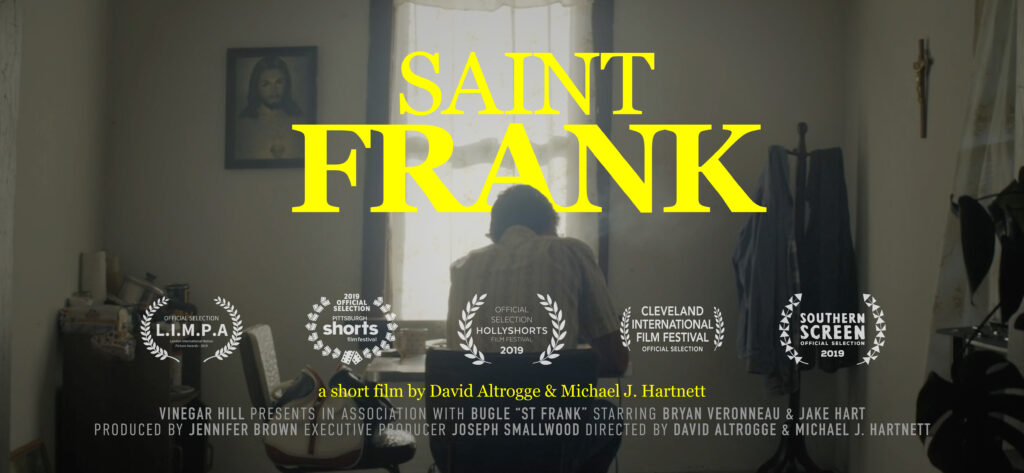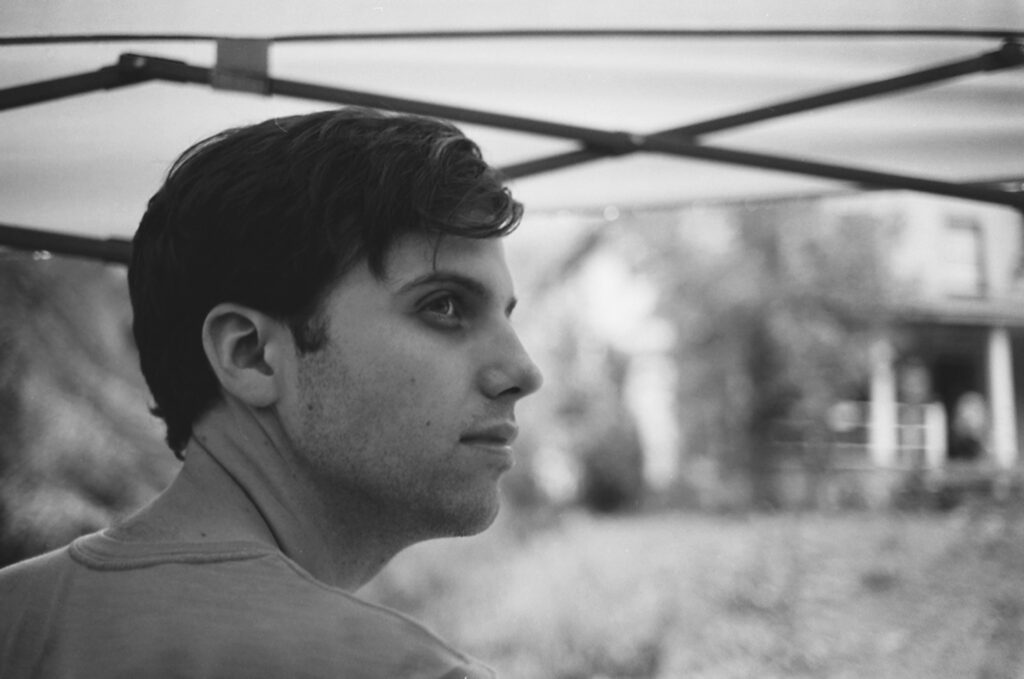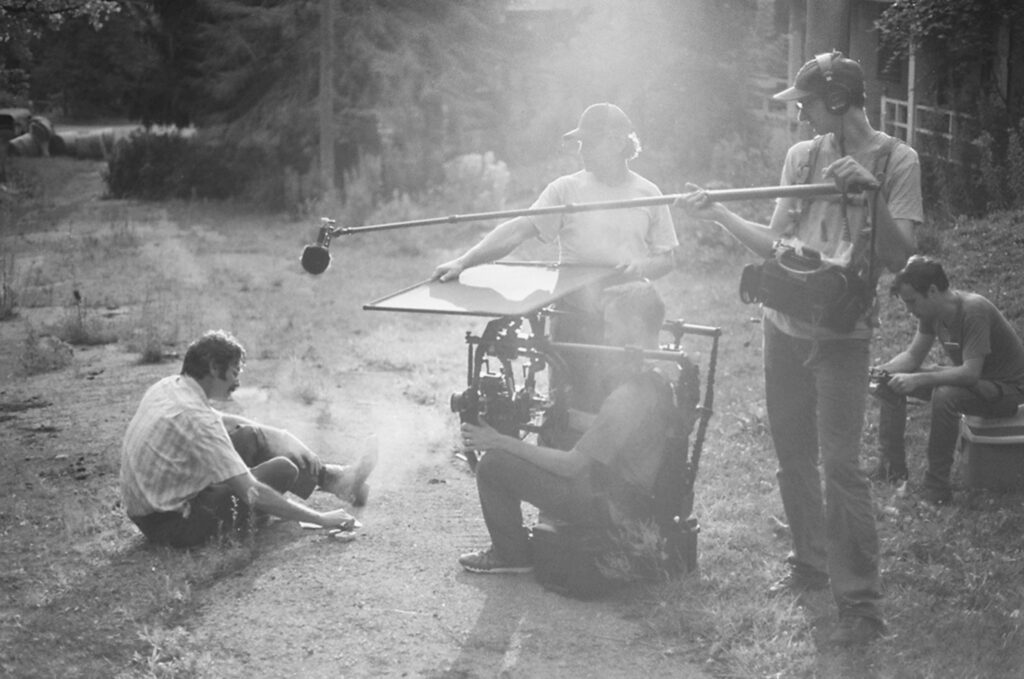
After a job goes wrong, Frank is called to clean up a mess he didn’t make. Saint Frank is a short film about best friends caught in a lose-lose situation. Creating it, however, was anything but a zero-sum game for Executive Producer Joseph Smallwood of Bugle and Writer and Director David Altrogge of Vinegar Hill. In this free-flowing conversation, these two friends, artists, and collaborators share their takes on why passion projects and creative side hustles matter, how business enables art, and their advice for anyone thinking about making their own films.
If you just wanna watch the film, click here to fast forward past two artists prattling on about ‘making movies.’ Otherwise, sit back, grab a drink, and enjoy the show. At the end of the day, this is just a bit of fun, which we hope’ll inspire others to take the leap and produce their own sideshow.
__________
A little background first chaps. How long have you worked together?
David Altrogge: In total, what is it now Joey, about six years?
Joseph Smallwood: Eight! We wrote our first script together in 2012. And until Saint Frank they’ve all been commercial projects. We’d gotten really good at producing documentaries, ads, and made for social videos. But this was our first short film together.
Stop plugging the film. I’ll embed the trailer below if you tell me what it’s like working together.
JS: Well, if you watch Saint Frank, I’d definitely say David is more like the character Mickey.
DA: Yeah, yeah. I knew you’d say that.
JS: David, it’s true. You’re the more happy-go-lucky one. Nothing ever breaks your stride. Frank is full of fatal flaws. But Mickey’s sanguine, full of optimism, hope, and humility.

Seriously though.
DA: We don’t have your typical producer and director relationship. Nor is it the traditional agency and production company relationship between Bugle and Vinegar Hill. On any project, Joey never starts doing the director’s job. He doesn’t want a button pusher. He knows we both want what’s best for the project and that our success is predicated on effective collaboration.
JS: It’s a practiced sense to listen, learn, and really try to feel out each other’s aspirations and needs. There’s real empathy, trust, and respect that allows us to see things that we wouldn’t otherwise have seen in ourselves and the material, and has opened us up as creatives to make awesome work together.
DA: Exactly! And over time we’ve been able to create a shorthand. We respect and understand each other’s roles. And that has inspired a deeper collaboration over the years.
What do you mean by shorthand?
JS: It’s really a way of communicating. The amount of back-and-forth needed to synthesize an idea is intense. We’re both willing to go the extra mile. We give ourselves deadlines on projects that keep us moving forward. But normally, that means three rounds of feedback with the understanding that three often becomes 30.
DA: Because the more time we give ourselves to really think about it, the more ideas flow, and the better we can refine them along the way.
What are some of the major differences between commercial work and passion projects?
DA: With your own films you have the freedom to try more things. You can change it as much as you want all the way through post.
JS: Which we did with Saint Frank. Less bureaucracy allows for more creativity.
DA: Right. We went through maybe 30 cuts and by the end had completely reworked the last scene to create more surprise and ambiguity. Commercial work is always evolving, too. But as the producer, Joseph always defends the client’s vision and makes sure we’re serving their needs and objectives first.
Anything else?
JS: Another major change is how decisions are made. As David has said, we both respect each other’s roles in a commercial project, but there’s also a hierarchy. Ultimately, the producer is the keeper of the client’s vision and the director is, well, the keeper of the script and production. In a passion project, those hierarchies are flatter. Just because you’re producing or funding something doesn’t mean you always get the final say. It’s a different kind of creative tension. And one I really enjoy.
Why do passion projects matter?
DA: They allow you to stretch muscles you’re not able to stretch otherwise. They give you time you wouldn’t have otherwise to explore, fail, and learn techniques. And I’ve found they reinvigorate my passion for filmmaking.
JS: Totally. We’re always thinking about how to bring filmmaking into our commercial projects. Saint Frank was a shot to turn the camera towards ourselves, and direct the skills learned on our client’s sets toward the production of our first short together. Now we get to think about how we pull those ideas forward in future commercial work, and inevitably on the film we’ll do next.

In the past, you’ve both spoken about how business drives art. Can you explain what you mean?
JS: An old mentor of mine once said, “Be careful what you do, because you’ll end up doing it.” So I want to play my part in telling stories that move people. Passion projects create spaces for us to explore and express a more original side of our stories. It moves us as a collective increasingly toward the type of work we aspire to do more of, with the kind of people we want to do it with.
DA: I started Vinegar Hill because I wanted to make films. It’s all I’ve wanted to do for as long as I can remember. We started making commercials to fund that passion. When we’re on set with Bugle, we’re always talking about the movies we’re watching and the things that inspire us. It’s what motivated me to get on the phone and say, “Hey Joey. I’ve got this idea for a film.” That’s business driving art.
What advice do you have for anyone who wants to make their own films?
DA: For directors, there’s nothing more valuable than nurturing relationships. Friendship over film. Relationships are what allow you to do passion projects. Nobody makes a film by themselves.
Joseph?
JS: My advice? Go for it! Maybe it’s just that getting older or soon to be a father, but I think as you mature as an artist, you’ll realize the most valuable resource you have is time. Not money. You can always make more money. And if you don’t have a big budget, that’s okay. You’ve got to start somewhere. You don’t have to make a feature-length film or even a 15-minute story your first go around. But you do have to start. So take a leap. Try it. What the hell do you have to lose?
Okay, now you can plug Saint Frank if you must.
DA: We’ll take it. Look, during this pandemic, it’s important to celebrate the beautiful and uplifting things in life. Brotherhood. Loyalty. Sacrifice. These are all human ideals that can get lost in the quagmire of current life. Saint Frank celebrates all those qualities.
JS: David and the Vinegar Hill team did a great job getting Saint Frank onto the circuit. It was featured at five festivals. And it won Gold at the recent Side Show Awards. The next step is getting more people to watch it. There are people out there on the lookout for non-COVID content. And Film Supply graciously offered to distribute the film for us. So check it out. Let us know what you think. I hope you enjoy it.
